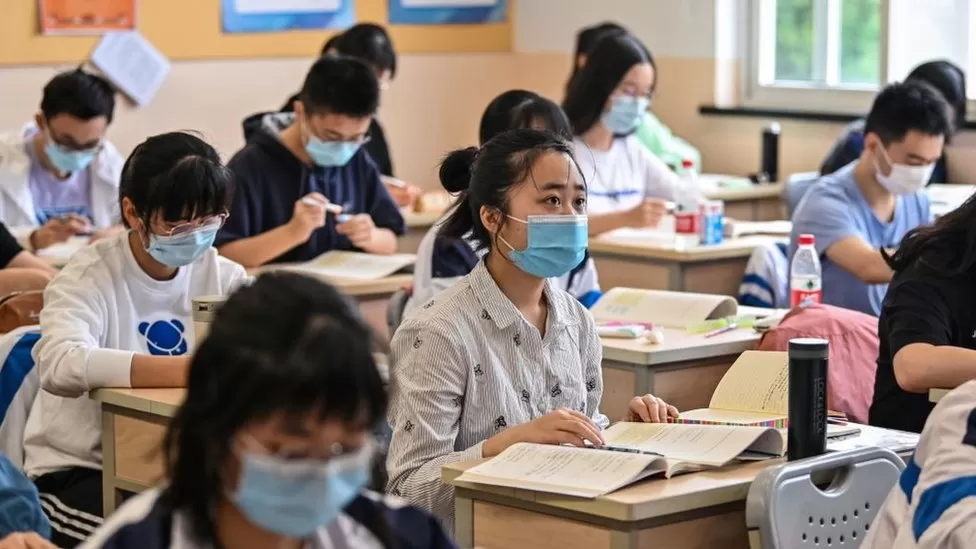‘Oku taupotu ‘i lalo ha fakamatala fakaTonga
China’s largest city, Shanghai, has ordered most of its schools to take classes online as Covid cases soar.

Nurseries and childcare centres will also shut from Monday, according to Shanghai’s education bureau.
Restrictions were eased by Chinese authorities earlier this month following a wave of protests targeting China’s zero-Covid strategy.
But the easing of strict lockdown measures has led to growing concerns over the spread of Covid in China.
Significant changes in the country’s Covid testing and reporting systems have made it difficult to know just how widespread the virus has become, with data for the week ending 11 December showing a fall in the total number of new infections across the country after peaking the previous week.
But prior to the change in data collection, the number of cases was higher than that of the last Covid wave in April.
Hospitals and medical facilities have come under increasing strain, with temporary health centres and intensive care facilities being set up across the country.
In Shanghai, it has been reported that an extra 230,000 hospital beds have been made available.
Some schools in the city have also already stopped in-person classes because teachers and staff are ill.
In a statement posted on Chinese social media site WeChat on Saturday, Shanghai’s education bureau announced that most year groups in primary and secondary schools would move to online learning from Monday.
Students and children who do not have alternative childcare arrangements can apply to attend school.
The statement said the measures were being put in place in order to protect the health of teachers and students in line with current coronavirus prevention measures.
The decision means that schools in the country’s financial hub will be closed for in-person learning until the end of term on 17 January, when the Lunar New Year holiday starts.
Some Chinese social media users praised the decision, agreeing that it was best that students stay at home. Others complained about the efficacy of online learning in relation to in-person teaching and the extra strains put on working parents.
Following its abandonment of its zero-Covid strategy, there has been an explosion of self-reported cases across the country, with many cities eerily quiet as large numbers of people isolate at home, either sick with Covid or trying to avoid becoming infected, reports the BBC’s Celia Hatton.
There are concerns that China’s health infrastructure is not prepared to cope with a rapid increase in patients – especially as Covid spreads among the elderly, many of whom are not fully vaccinated.
FAKAMATALA FAKATONGA
Ko Shanghai, ‘a e kolo lahi taha ko ia ‘i Siaina kuo tu’utu’uni ai ki he konga lahi ‘o e ngaahi ‘apiako ke fakahoko fakakomipiuta [online] pē ‘enau ngaahi kalasi koe’uhi ko e tu’unga fakatu’utāmaki ‘oku ‘i ai ‘a e kau puke ‘i he Kōviti.
Fakatatau ki he tafa’aki ongoongo fakaako ko ia ‘a Shanghai, mei he Mōnite ‘e tāpuni ai ‘a e ngaahi senitā ko ia ki hono tokangaekina ‘o e longa’i fānau iiki.
Ka ‘i he kamata’anga ‘o e mahina ni na’e fakangaloku ai ‘e he kau ma’u mafai ‘o Siaina ‘a e ngaahi fakangatangata hili ia ‘o ha ngaahi fakahāloto na’e fakataumu’a ke fakangata ‘a e ngaahi tu’utu’uni ki he Kōviti.
But the easing of strict lockdown measures has led to growing concerns over the spread of Covid in China.
Significant changes in the country’s Covid testing and reporting systems have made it difficult to know just how widespread the virus has become, with data for the week ending 11 December showing a fall in the total number of new infections across the country after peaking the previous week.
But prior to the change in data collection, the number of cases was higher than that of the last Covid wave in April.
Ka ‘i hono fakangalku ko ia ‘o e ngaahi tu’utu’uni ki he tātāpunu malu’i ‘oku tupu ai ha hoha’a lahi ki ha toe mafola ‘a e Kōviti ‘i Siaina.
‘I he liliu lahi ko ia ‘oku hoko ki he founga ‘o e sivi Kōviti mo hono lipooti ‘i he fonua ko ne fakafaingata’a’ia’i ai ke ‘ilo ki he anga ko ia ‘o e mafola ‘a e vailasi, ka ‘oku hā mei tānaki’anga fakamatala ko ia na’e ‘osi ki he ‘aho 11 ‘o Tīsema, ‘a e holo ‘i he toko lahi ‘o ha toe kau puke fo’ou ‘i he fonua, hili ia ha’ane kaka ma’olunga ‘i he uike ki mu’a.
Ka ki mu’a ki he liliu ko ia ‘o e ngaahi tānaki’anga fakamatala, na’e ma’olunga ange ‘a e toko lahi ia ‘o e kau puke ‘i he’ene hoko ko ia ‘i ‘Epeleli.
Hospitals and medical facilities have come under increasing strain, with temporary health centres and intensive care facilities being set up across the country.
In Shanghai, it has been reported that an extra 230,000 hospital beds have been made available.
Some schools in the city have also already stopped in-person classes because teachers and staff are ill.
Na’e hoko foki ha liliu lahi ki he ngaahi falemahaki mo e ngaahi naunau fakafaito’o, ‘o aku ai hono fokotu’u ‘i he feitu’u kehekehe ‘i he fonua ‘o e ngaahi senitā ki he mo’ui lelei mo e tauhi makehe.
Kuo fakahā foki mei Shanghai kuo toe ‘i ai ‘eni mo e ngaahi mohe’anga fakafalemahaki ‘e uakilu tolumano [230.000]
Kuo tu’u foki mo e ngaahi ‘api ako ‘i he loto kolo koe’uhi ko e puke ‘a e kau faiako mo e kau ngāue.







